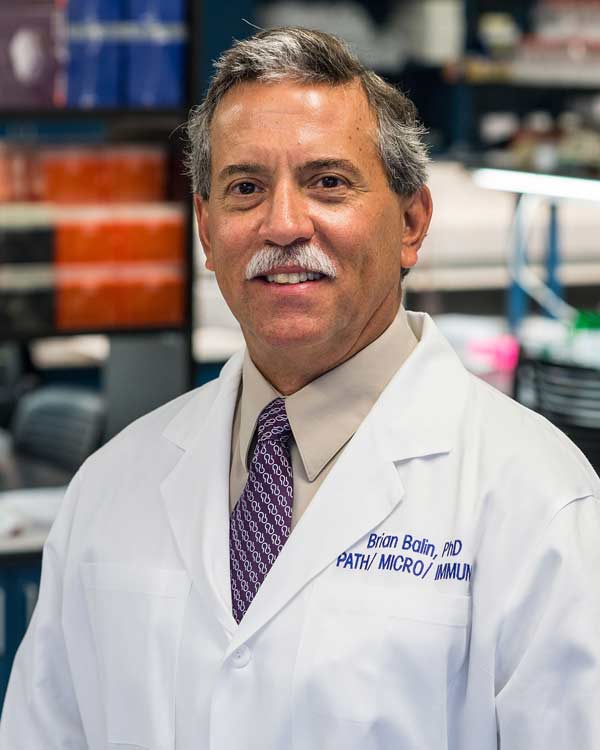Alzheimer’s Researcher Publishes in Lancet Neurology
October 24, 2018 The search for an effective treatment for Alzheimer’s has continued to elude researchers.
A growing number of researchers contend this is because current research is focusing
on the wrong area—the end pathology of the disease, not its root cause.
The search for an effective treatment for Alzheimer’s has continued to elude researchers.
A growing number of researchers contend this is because current research is focusing
on the wrong area—the end pathology of the disease, not its root cause.
For more than 20 years, Brian Balin, PhD, and his team have been working under the hypothesis that infectious agents—in this case, Chlamydia pneumoniae—could be a trigger for the process that causes the accumulation of amyloid and tau
build-up, which are key indicators of Alzheimer’s disease. In fact, their research
thus far has shown the presence of the intracellular bacteria in the brains of those
who had died from the disease.
In this month’s issue of The Lancet Neurology, he and co-author Alan Hudson, PhD, at Wayne State University, call for more funding
for this rapidly growing area of research to determine if antimicrobial agents could
be an effective strategy for treating a disease that currently has had very little
success with therapeutics.
“Answers to the questions of Alzheimer’s disease, and possibly other neurodegenerative
conditions as well, does not reside solely in the pathology, but rather in the route
to that pathology, for which infectious agents provide biologically and pathologically
relevant solutions,” wrote Drs. Balin and Hudson.
Dr. Balin argues that many researchers from across the country and the world are finding
that infectious agents are being harbored in the brain, and can trigger another factor:
inflammation. He describes it as firing a gun.
“You can have a loaded gun, but the trigger has to be pulled to inflict damage,” he
said. “In the case of Alzheimer’s, the bullet is the infection, and once triggered,
the infection will result in inflammation in the brain; genetic predisposition, trauma
in the brain or even the aging process itself may exacerbate this process.”
Dr. Balin adds that the growing body of work in this area can no longer be ignored.
“We’ve been hearing the amyloid/tau story for 30 years, but it hasn’t given us any
answers as to why the disease occurs,” he said. “We need a better understanding of
the upstream cellular processes that lead to this outcome, and we need the support
to do that.”
This charge laid out by Drs. Balin and Hudson in their latest paper comes after a
2016 editorial in the Journal of Alzheimer’s Disease that Dr. Balin co-authored with 32 other researchers from around the world. In it,
the authors called for more research on the role of infection in the onset of Alzheimer’s
and the need for clinical trials to begin using antimicrobial treatments.
“Anti-amyloid drugs have not been successful thus far,” explained Dr. Balin. “It’s
time to focus on trials that explore the use, possibly in combination, of antibiotics,
antivirals and anti-inflammatories as a method of slowing the progression of Alzheimer’s
or, perhaps even stopping it completely. This avenue of research into the cause of
Alzheimer disease can no longer be ignored.”
You May Also Like:
About Philadelphia College of Osteopathic Medicine
Established in 1899, Philadelphia College of Osteopathic Medicine (PCOM) has trained
thousands of highly competent, caring physicians, health practitioners and behavioral
scientists who practice a “whole person” approach to care—treating people, not just
symptoms. PCOM, a private, not-for-profit accredited institution of higher education,
operates three campuses (PCOM, PCOM Georgia and PCOM South Georgia) and offers doctoral degrees in clinical psychology, educational psychology, osteopathic
medicine, pharmacy, physical therapy, and school psychology. The college also offers
graduate degrees in applied behavior analysis, applied positive psychology, biomedical
sciences, forensic medicine, medical laboratory science, mental health counseling,
physician assistant studies, and school psychology. PCOM students learn the importance
of health promotion, research, education and service to the community. Through its
community-based Healthcare Centers, PCOM provides care to medically underserved populations.
For more information, visit pcom.edu or call 215-871-6100.
Contact Us
For general media inquiries, please contact the Office of Marketing and Communications
at 215-871-6300 or communications@pcom.edu. Visit our media relations page to view contact information for public relations personnel.
Connect with PCOM
 The search for an effective treatment for Alzheimer’s has continued to elude researchers.
A growing number of researchers contend this is because current research is focusing
on the wrong area—the end pathology of the disease, not its root cause.
The search for an effective treatment for Alzheimer’s has continued to elude researchers.
A growing number of researchers contend this is because current research is focusing
on the wrong area—the end pathology of the disease, not its root cause.